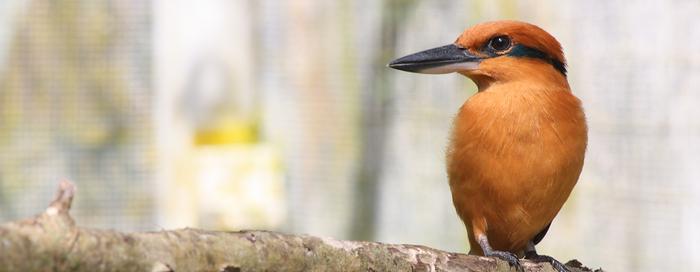DENVER/Oct. 25, 2023 – A recently published paper in Animal Conservation provides crucial insights into the health of sihek, a species eradicated from its native habitat and that may now face threats in captivity. The latest data underscores a stark gender disparity, revealing that female sihek are at greater risk for death and disease than their male counterparts.

Credit: John Ewen, courtesy of Amanda Trask.
DENVER/Oct. 25, 2023 – A recently published paper in Animal Conservation provides crucial insights into the health of sihek, a species eradicated from its native habitat and that may now face threats in captivity. The latest data underscores a stark gender disparity, revealing that female sihek are at greater risk for death and disease than their male counterparts.
As part of an ongoing Morris Animal Foundation-funded study, researchers at The Zoological Society of London are investigating the health of sihek, also known as the Guam kingfisher. Their work encompasses a range of issues including hatching failure, female health, mortality rates and genetic threats impacting the bird.
“The sihek is a species on the very brink of being lost forever – and it is only due to the care and expertise of conservation zoos that these birds still exist, giving us a chance to return them to the wild,” said Dr. Amanda Trask, the study’s principal investigator. “Conservationists, zookeepers and scientists working to restore a wild population. They are working at the cutting edge of conservation, and we must continue to review and build upon existing knowledge of their care to ensure that the species has the best possible chance.”
Trask said the research team examined the causes of death in the birds and found differences between males and females. Females succumbed to reproductive diseases – a phenomenon not observed in males. The incidence of reproductive diseases among female sihek was also notably higher than in other avian species. While it’s still unclear why this is occurring, she added that the team’s upcoming research will delve into a potential correlation with increased egg production. Other causes of death, such as nutritional and metabolic diseases, were seen in both males and females, but females tended to succumb at younger ages than males.
Trask thanked the Foundation for supporting her work and looks forward to continuing her support of the international initiative involving Zoos from the Association of Zoos and Aquariums, federal and Guam agencies and non-governmental conservation organizations, to return sihek to the wild.
“The grant has also been essential to develop my career and research interests at the interface between wildlife health and conservation biology,” Trask said. “It has allowed me to continue producing research with direct application to threatened population management strategies and species recovery planning.”
About Morris Animal Foundation
Morris Animal Foundation’s mission is to bridge science and resources to advance the health of animals. Founded in 1948 and headquartered in Denver, it is one of the largest nonprofit animal health research organizations in the world, funding nearly $160 million in more than 3,000 critical animal health studies to date across a broad range of species. Learn more at morrisanimalfoundation.org.
Media Contact: Annie Mehl
Journal
Animal Conservation
Article Title
Balancing conservation and welfare in ex situ management of the extinct in the wild sihek: sex- and age-specific causes of mortality and contributions to population growth rate




